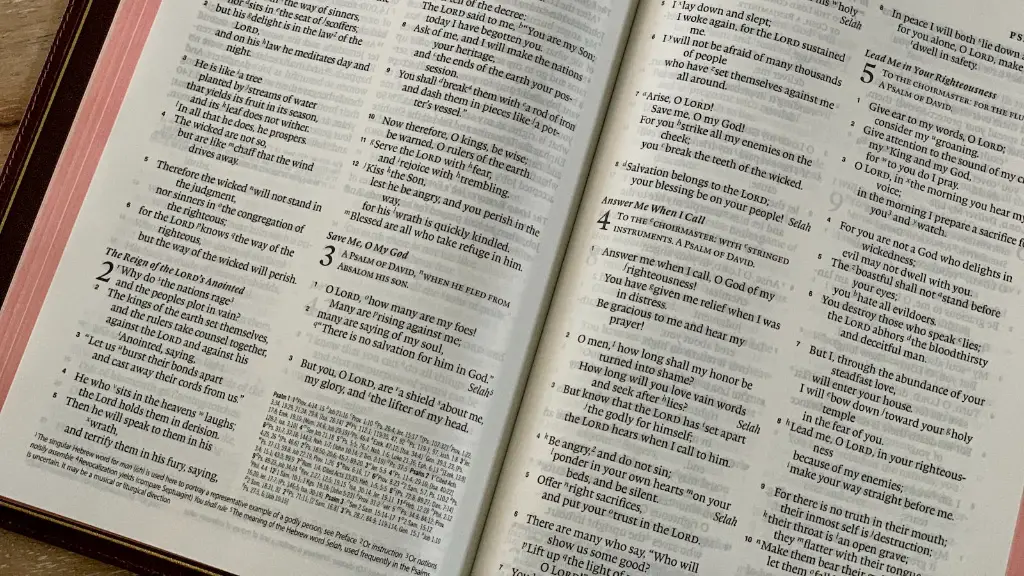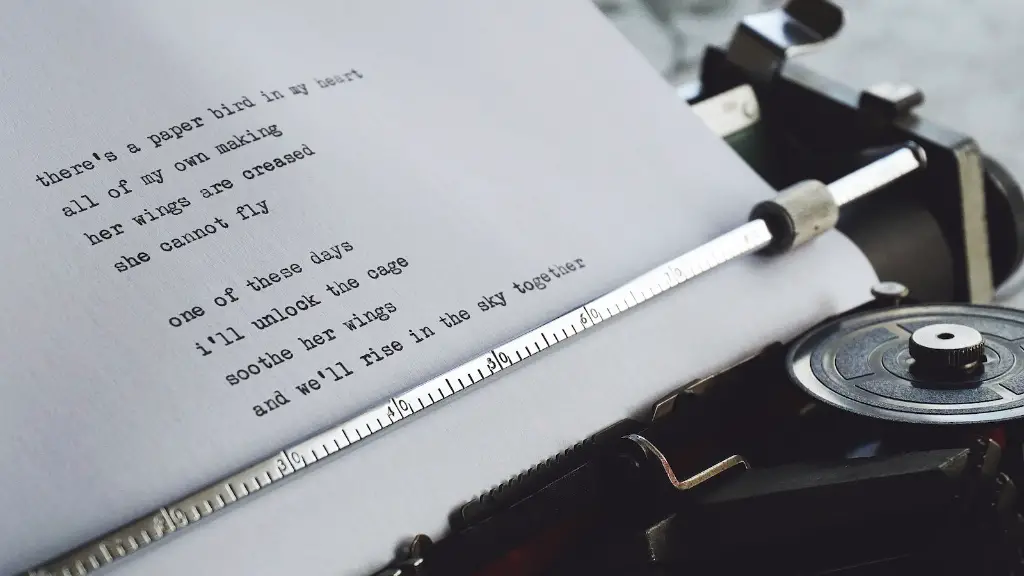How Poetry Affects the Feelings
Poetry is one of the oldest art forms, and its ability to evoke emotions has stood the test of time. From ancient epics to Shakespeare’s sonnets, it has been used to express a wide range of feelings and experiences in vivid and powerful ways. But how does poetry make us feel, and why do we seek it out in times of joy and sorrow?
At its foundation, it is safe to say that poetry can arouse emotion by manipulating the language in which it is written. By using specific words and line lengths, poets can create a rhythm that conveys emotion more powerfully than spoken words alone. By stringing these words together, the reader often experiences a certain emotion as they journey through the poem. This is why poetry is sometimes referred to as a language of emotion.
Aside from the language itself, another main factor in how poetry affects our emotions is the way in which it is interpreted. Every reader will bring their own feelings and perspectives to the poem, and how they interpret each line will shape their experience of it. For example, a poem about love could be interpreted in different ways depending on the reader’s experiences with love. It is this individual connection to the poem that makes it so personal and emotional.
Another key element of poetry that we often overlook is its ability to take us on a journey. Through its imagery, poets can transport us to a different world, one that can feel distant from our own. This can be both a comforting and disconcerting experience, as these worlds often feel like they exist in our minds rather than in the physical world. As we journey through these often abstract landscapes, poems can evoke a range of complex emotions that can be difficult to express in everyday language.
Finally, poetry can also be therapeutic. By giving us the space to identify and express our feelings, it can help us make sense of difficult times. Poetry can help us reconnect with our emotions, allowing us to access feelings that we may have kept hidden away. In this way, poetry can help us heal from pain, as well as allowing us to find joy and comfort in words.
The Power of Engrossment
When reading a poem, one can often get so engrossed in it that they completely lose track of time. This feeling of being completely immersed in a text is one of the most powerful and inspiring elements of poetry. It is often said that good poetry should take its readers on a journey and captivate them in such a way that they cannot look away. This power of engrossment often leads to a strong emotional bond between the reader and the poem, a connection that can be just as moving as any physical interaction.
The cause of this connection lies in the language used by the poet. With each line, a poet is able to create a vivid and emotionally charged world that is often only accessible through the poem itself. This combination of evocative imagery and lyrical language can create a feeling of intimacy between the reader and the poem that can be both comforting and uncomfortable. As we are invited into this world, it can feel like our emotions are being stirred and manipulated, as if by an invisible force that transcends language and sense.
The power of this connection can be seen in the way that certain poems can take on a life of their own, inspiring and influencing those who read them. In this way, a poem can become more than just words on a page, it can become a living and breathe entity that exists in the minds of its readers. This unique bond can be both a source of joy and comfort as well as a powerful tool of self-expression.
The power of engrossment is also evident in the way that certain poems can remain with us long after we have finished reading them. These poems can become a part of us that we revisit in times of joy and sorrow, a source of comfort and connection that we can refer back to when the need arises.
The Joys and Sorrows of Poetry
It is often said that poetry serves as a mirror for our souls, allowing us to explore and express our deepest feelings in ways that words alone cannot. Poetry can be a refuge in times of joy and sorrow, a place to escape to when we are feeling lost or overwhelmed. It can also be a source of hope and inspiration each time it is read.
Poetry can help us find joy in life’s everyday moments, reminding us to stop and appreciate the beauty around us. It can also show us that there are moments of joy to be found even in times of darkness. For example, a poem about death can provide comfort in the knowledge that life is fleeting and that the best thing to do is to appreciate what we have while we still can.
On the other hand, poetry can also help us to cope with sorrow. When dealing with a difficult period in life, poems can provide an outlet for our feelings, allowing us to express ourselves in ways that would otherwise be impossible. This can be a great source of relief and comfort, reminding us that we are not alone in our struggles.
Finally, poetry can be a source of inspiration in times of need, reminding us that even in our darkest moments, there is still beauty to be found. It can motivate us to pursue our dreams and remind us that there are always better days ahead.
The Process of Discovery
One of the great joys of reading poetry is in the process of discovery. As we read, we become more familiar with the world of poetry and the ways in which language can be crafted to evoke different emotions. We learn to appreciate the skill and craft that goes into creating a poem, and we gain a greater understanding of how to harness language for our own use.
This process of discovering different techniques and approaches can open up a world of possibilities for poets of all skill levels. For beginners, it can be a learning experience that can lead to greater confidence and understanding of how to best express oneself through words. For more experienced poets, it can be a source of creative inspiration and guidance on how to refine and improve their work.
At its root, the process of discovery is a journey of exploration and understanding that allows us to better comprehend the world around us. Through these journeys, we can gain a greater insight into our own emotions and experiences, and this understanding can be a powerful tool in learning how to express ourselves.
Conclusion
As can be seen, poetry is a powerful and effective way to explore emotions, gain a better understanding of ourselves, and find joy and comfort in times of joy and sorrow. Through its creative use of language and ability to take us on journeys, poetry can evoke a unique and powerful emotional connection that can often be more powerful than words alone. As we journey through these landscapes, we discover the beauty and power of poetry, making it one of the most beloved forms of art in the world.
The Impact of Poetry on Different People
Due to its highly individualistic nature, the impact of poetry on different people can vary greatly. For some, it may merely be an enjoyable hobby that they turn to when they are feeling bored or in need of a distraction. However, for many others, poetry can provide much more than just a fleeting comfort, it can become a source of solace and inspiration in times of joy and sorrow.
Poetry can be especially beneficial for those who find it difficult to express their emotions. By allowing us to explore and express our feelings in our own words, it can help us better understand ourselves and find ways to process our emotions. This can provide an invaluable outlet for those who feel overwhelmed or trapped by the difficulties of life.
For those who are struggling with mental health issues, such as depression or anxiety, poetry can be a means of self-expression and a powerful tool in discovering alternative ways of viewing the world. Poetry can also be used as a form of therapy, helping to process difficult emotions and experiences and allowing individuals to gain a greater insight into their own thoughts and feelings.
Finally, poetry can also be a valuable tool in connecting with others. By sharing poems with each other, we are able to open up and relate to one another on a deeper level. In this way, poetry can be a powerful tool in creating understanding and solidarity between different people.
The Role of Poetry in Society
Throughout history, poetry has been used as a powerful tool for expressing and inspiring political and social change. From Shakespeare’s sonnets to Maya Angelou’s powerful words, poetry has been an important source of resistance, resilience and hope in times of adversity. By giving voice to those who are often silenced or forgotten, poetry offers a powerful platform for sharing experiences, raising awareness, and inspiring positive change.
As well as being a source of comfort and inspiration for individuals, poetry can also provide a constructive outlet for collective unrest. By articulating the feelings and experiences of a community, it can provide a platform for dialogue and help us to channel our frustrations in constructive and meaningful ways. This can be especially important in times of political turmoil, when more traditional forms of protest may be unavailable.
Poetry can also provide a way to preserve culture, history and traditions in societies that have been oppressed or have their histories distorted. Through its powerful and often undervalued words, poets can preserve the stories and experiences of their communities, ensuring that they are not forgotten in the annals of history.
Finally, poetry can be an important tool in bridging the gap between different cultural and social groups. By allowing us to view the world from different perspectives, it can help us to better understand and respect one another, allowing us to create meaningful connections between our lives and those of others.





